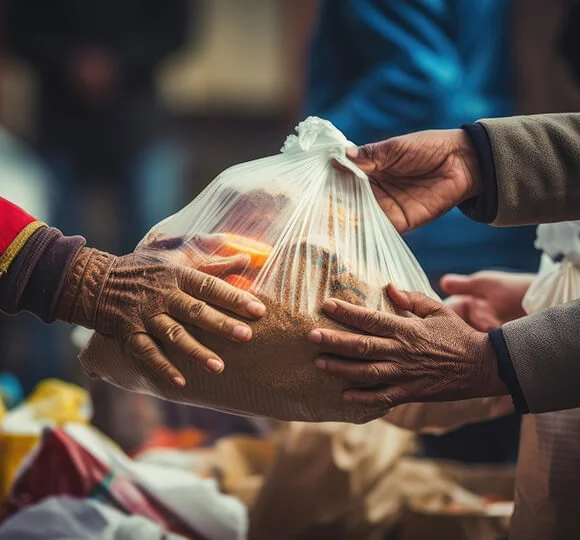
Extending Help to Needy Individuals
Helping needy people is a core aspect of humanitarian efforts aimed at addressing poverty, hunger, and social inequality.
Our commitment to serving those in need extends to individuals and families facing adversity in our communities. Through our outreach programs and support services, we provide vital assistance to needy people, including food aid, shelter support, healthcare services, and livelihood opportunities.
By offering a helping hand during times of crisis and uncertainty, we aim to alleviate suffering, restore hope, and empower individuals to overcome challenges and build a brighter future for themselves and their families.
How individuals, organizations, and communities can extend a helping hand to those in need:
Direct Assistance: Providing direct assistance to needy individuals and families can take various forms, including offering financial aid, donating food, clothing, and essential supplies, or offering shelter to those experiencing homelessness. This direct support helps meet immediate needs and offers temporary relief to those facing adversity.
Community Support Programs: Supporting community-based programs and initiatives that cater to the needs of the needy can have a broader impact. This includes volunteering at local food banks, homeless shelters, or community kitchens, participating in clothing drives, or contributing to community funds aimed at assisting vulnerable populations.
Education and Skills Development: Empowering needy individuals through education and skills development programs can help break the cycle of poverty. Supporting initiatives such as adult education classes, vocational training programs, or mentorship programs can equip individuals with the skills and knowledge needed to improve their livelihoods and access better opportunities.
Healthcare Assistance: Access to healthcare is a basic human right, yet many needy individuals lack access to essential medical services. Supporting healthcare initiatives such as free medical camps, mobile health clinics, or subsidizing healthcare costs for the needy can make a significant difference in improving health outcomes and well-being.
Emergency Relief: Needy individuals are often disproportionately affected by natural disasters, conflicts, and other emergencies. Providing emergency relief assistance, such as distributing food, water, shelter materials, and medical aid during crises, helps mitigate the immediate impact of disasters and ensures the safety and well-being of those affected.
Advocacy and Awareness: Advocating for policies and programs that address the root causes of poverty and social inequality is essential for creating systemic change. Raising awareness about issues affecting the needy, advocating for social justice, and supporting initiatives that promote equity and inclusion are crucial steps towards building a more just and compassionate society.
Collaborative Partnerships: Collaborating with other organizations, businesses, and government agencies can amplify efforts to help the needy. Partnering with local authorities, community organizations, and NGOs to develop and implement sustainable solutions to address poverty, homelessness, and other social challenges ensures a holistic and coordinated approach to supporting those in need.
Promoting Dignity and Respect: Recognizing the inherent dignity and worth of every individual is paramount in efforts to help the needy. Providing support in a manner that upholds their dignity, respects their autonomy, and fosters self-reliance and empowerment is essential for promoting long-term positive outcomes and building strong, resilient communities.
Long-Term Engagement: Sustainable change requires long-term engagement and commitment. Investing in programs and initiatives that promote economic empowerment, social inclusion, and community development ensures that support for the needy is not just temporary relief but a pathway towards lasting change and improved quality of life.
Inspiring Compassion and Generosity: Inspiring others to join in the effort to help the needy is crucial for creating a culture of compassion and generosity. Sharing stories of impact, engaging in community outreach, and encouraging others to get involved through volunteering, fundraising, or advocacy efforts can mobilize collective action and create a ripple effect of positive change.
By embracing these approaches and actively engaging in efforts to help the needy, individuals, organizations, and communities can contribute to building a more equitable, compassionate, and inclusive society where everyone has the opportunity to thrive and lead a dignified life.